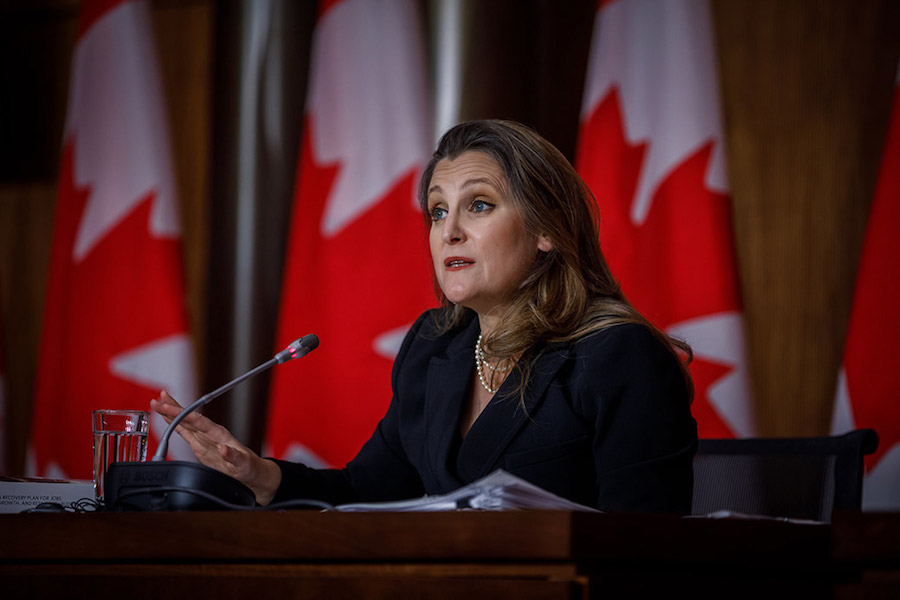
Ottawa is discontinuing three federal pandemic aid programs for people and businesses when they expire on Saturday (October 23).
Finance Minister Chrystia Freeland said during a press conference on Thursday that the Canada Response Benefit (CRB), the Canada Emergency Wage Subsidy (CEWS) and Canada Emergency Rent Subsidy (CERS) are no longer needed because the economy is rebounding from COVID-19.
However, Prime Minister Justin Trudeau’s government will continue offering targeted aid to specific sectors that still face financial hardship and lockdown restrictions as part of what Freeland called “the final pivot.”
“Our economy is rebounding,” she said. “However, it’s also true that the recovery is uneven and that the health measures that are saving lives continue to restrict some economic activity.
“We are moving from the very broad-based support that was appropriate at the height of our lockdowns to more targeted measures that will provide help where it is needed,” she continued, adding future income support must be “narrow and less expensive.”
Effective October 24, the government will introduce the Canada Worker Lockdown Benefit that will give workers under local COVID-19 restrictions $300 per week. Those who are not eligible for employment insurance can collect the payment, which will run until May 7.
This new benefit replaces the CRB, which replaced the Canada Emergency Response Benefit (CERB) last year. The CRB provided income support to employed and self-employed people who are ineligible for employment insurance and amounted to $1,000 ($900 after taxes withheld) or $600 ($540 after taxes withheld) for a two-week period.
The Canada Recovery Sickness Benefit and Canada Recovery Caregiving Benefit will continue to May, Freeland said.
Asked what would happen in the event of a future COVID-19 wave, Freeland said income support programs would return.
“We want public health authorities to know and we want workers to know that that support will be there,” she said. “It will be able to snap back into place for workers.”
Targeted support for struggling businesses
Meanwhile, two more programs will be aimed at struggling businesses to replace the CEWS and CERS, Freeland said.
The Hardest Hit Business Recovery program will be available to employers who can show they have faced “deep and enduring losses.” It will provide support via rent and wage subsidy programs. The subsidy rate will start at 10 per cent for applicants with a 50 per cent revenue loss and increase to 50 per cent for businesses that can show a 75 per cent loss in revenue.
To qualify, businesses must show a 50 per cent revenue loss over 12 months of the pandemic and 50 per cent in the current month.
The second subsidy for businesses is the Tourism and Hospitality Recovery Program, which is aimed at restaurants, hotels, travel agencies and other tourism-related businesses. This support will offer these sectors a subsidy rate of up to 75 per cent.
To qualify, tourism and hospitality businesses must show average monthly revenue losses of 40 per cent over 12 months of the pandemic plus a 40 per cent revenue loss in the current month.
Both support programs will be available to employers from October 24 to May 7, but the subsidy rate will drop by 50 per cent on March 13 as Canada prepares for “a full recovery and the end of these extraordinary pandemic-related benefits,” Freeland added.
Businesses in areas under temporary new lockdown measures will be eligible “for up to the maximum amount of the wage and rent subsidy programs, during the local lockdown, regardless of losses over the course of the pandemic,” the Department of Finance said in a news release.
Freeland also said Ottawa will extend the Canada Recovery Hiring Program, which covers up to 50 per cent of costs of hiring workers, to May 7. It was originally set to expire on November 20.
The government estimates the new programs will cost $7.4 billion.
Ottawa has paid out $95 billion to businesses via the wage subsidy and $6.8 billion via the rent subsidy. To date, Canada has spent $289 billion on income and business support programs during COVID.
Following the announcement, NDP leader Jagmeet Singh criticized the government for “cutting help for people in the middle of a fourth wave.
“[Trudeau] has the power to extend help to those who depend on it, but has chosen not to,” Singh tweeted. “Canadians deserve a government that will fight for them, not leave them behind.”
The announcement comes a day before Premier Doug Ford’s government is expected to detail a plan to lift remaining lockdown restrictions in Ontario and exit step 3 of the reopening plan.












